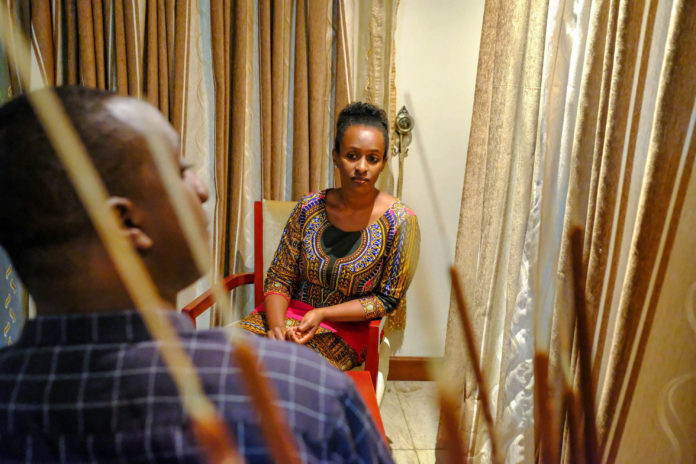Diane Rwigara lived much of her life outside Rwanda, traveling between California and Kigali. A family photo hanging on the wall of the living room shows a young, smiling Rwigara holding onto the shoulders of her father. She, like her father Assinapol Rwigara — a successful businessman — were at one time strong Kagame supporters.
“Blinded by how clean the streets are, how beautiful the city is… she thought it was the miracle country that had been talked about,” Anne says.
“But when she got on site it was a different story.”
In 2015, Rwigara returned to Rwanda from California after her father died in a car crash in suspicious circumstances. The official police report said that a truck driver had crashed into Assinapol’s car, which resulted in his death. But the Rwigaras allege that members of Kagame’s party harassed Assinapol — who was an important financier of the RPF in the early 1990s — after he refused to allow the government to seize control of his business and that he was killed on the president’s orders.
The Rwigaras wrote to Kagame calling the crash an assassination and asking for a full and transparent inquiry.
“They will come in and take over what you worked for your whole life,” Anne says.
“Next thing you know you won’t have that business, you will be working for them… at best… they will kick you out of the business.”
Rwanda’s National Police, the Office of the President and the RPF have not responded to CNN’s request for comment.
Anne Rwigara looks outside, beyond the metal gates that guard the house.
There, two stationary cars, sit for hours at a time watching the residence. Anne and Arioste say they are government surveillance vehicles.
The 2018 World Bank Doing Business Report named Rwanda the second-best place to do business in sub-Saharan Africa and it’s ranked among the least corrupt countries on the continent, according to Transparency International’s 2017 Corruption Perception Index.
But when Rwigara sought to learn more about her father’s death, her family says she found a very different picture. This was the “catalyst” for Diane’s political awakening, her siblings say.
She questioned what she saw as suspicious deaths and disappearances of prominent businessmen, lawyers, journalists and a former intelligence official, among others, Anne says. Groups such as Human Rights Watch and Amnesty International previously have highlighted those cases.
Rwanda’s National Police and the Office of the President have not responded to CNN’s request for comment on those cases.
In the lead-up to her presidential bid, Rwigara traveled outside Kigali, where most Rwandans live below the poverty line. She garnered support from many young people in rural areas and worked with volunteers like Eric to gather enough signatures to run for president.
Her press conferences and meetings were well attended by young people and journalists alike. That support was a surprising concern to some ruling party leaders, say her family and a local journalist who attended the meetings.
“There was a lot of fear surrounding what she was exposing about the country,” Anne says. Young people who attended her meetings would “see themselves in her,” she adds.
“Diane would talk about things they’d (the ruling party) been trying to hide away from public eye: famine, persecution, etc. She could sense their pain and they wanted to support her. They were really behind her… a lot of people thought: ‘enough was enough’ at this point, what do we have to lose?'”
Diane Rwigara knew her political aspirations would amount to “suicide,” Anne says, referring to a political climate marred by violence and jail terms. But she was willing to risk it. When Diane told her family she was planning to run for president, they were against it. They were concerned for her safety and her future.
Diane, they say, responded: “Is this a life? Do you even think you are living?”































































